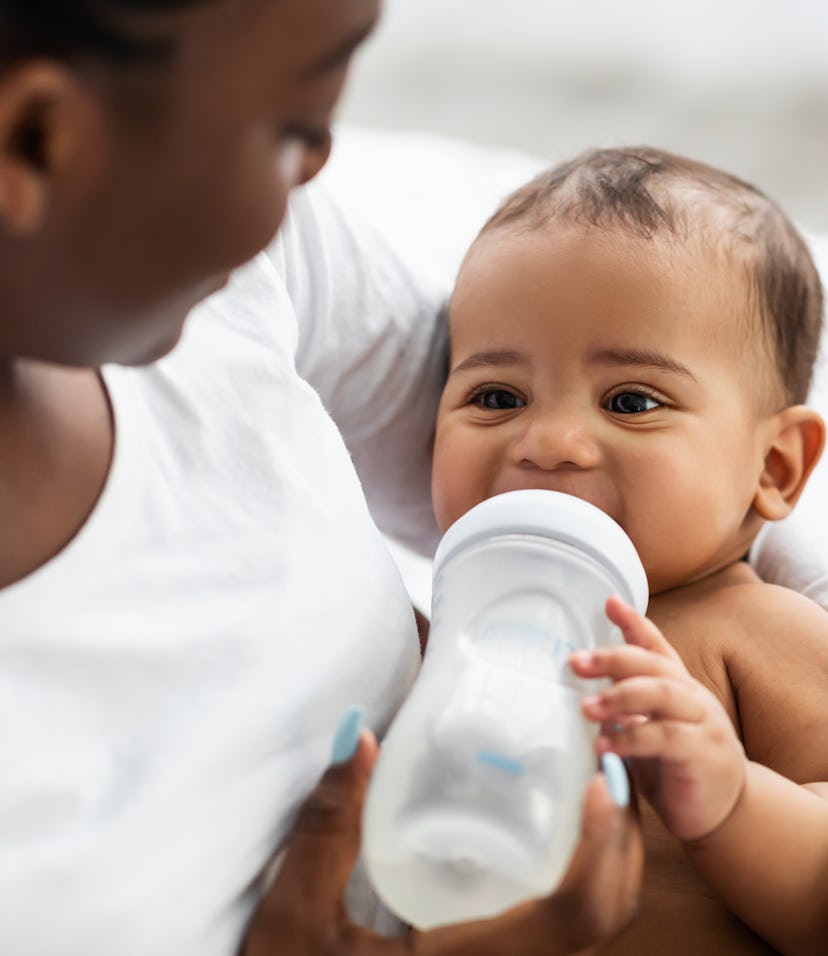Baby

Do Babies Actually Know When They're Full?
You definitely don't want to overdo it.
Before your baby is born, you imagine all the time you’ll spend with them, snuggling and cuddling and gazing lovingly into their eyes. But when baby makes their debut, it’s quite another story altogether. Because for someone born with a stomach the size of a pea, they can really seem to pack it in, food-wise. After all, it can feel like all you’re doing all day every day is feeding your little one, over and over again. And because newborns are known to puke and poop in the most brilliantly explosive manner, it might make you wonder if babies know when they are full or not, because all of that milk has to be going somewhere.
For someone so tiny, it sure might seem like your little guy or gal is pretty gluttonous. But before you turn your baby over looking for the off switch, just know that your child does know when they’re full or not, according to Dr. Denise Scott, M.D., a pediatrician with JustAnswer. “Babies come with a remarkable self-regulation system when it comes to eating,” says Dr. Scott. “Typically, when they're hungry, they eat, and when they're full, they stop.”
Does Your Baby Know When They Are Full?
So why is your little one always so ravenous? Well, part of that might have to do with how they’re being fed. A PubMed study looked at infants’ ability to self-regulate their milk intake depending on whether they were bottle-fed or nursed. Interestingly enough, babies who were bottle-fed early on in their infancy were much more likely to drain a bottle or cup as they got older.
Does that mean, then, that a bottle-fed baby might consume more than they should? It’s possible, Dr. Arunima Agarwal, M.D., a board-certified general pediatrician in New York tells Romper. “Young babies under 3 months have a sucking reflex, so it is possible to overfeed,” Dr. Agarwal explains. “If a baby is exclusively breastfed it's harder to overfeed, though, compared to bottle feeding.”
How Much Should Your Baby Be Eating, Anyway?
You don’t want to overfeed your baby, but you definitely don’t want to inadvertently starve your little sweetie, either. That’s why you need to know, more or less, how much to give your baby based on their age. “Talk to your pediatrician about the approximate amount your baby should feed — for example, ages 0-4 months should drink about 2-4 oz, 8-12 times per day,” explains Dr. Agarwal. “A baby eats more at a feed as they grow, so by 5-6 months they will probably drink 4-6oz at a time, and by 7-12 months they drink 6-8oz per feed.”
Is There A Way To Tell If Baby Is Full?
Luckily, it’s not too hard to discern if your baby’s belly is full of milk. “Initially, when hungry, an infant will suck more vigorously and continuously,” says Dr. Scott. “Once they are feeling full, they begin to take longer pauses between sucking and may release or turn away from the bottle or breast.” Additionally, a full baby will be more content, and according to Dr. Scott, they’ll be more relaxed with their hands open rather than fisted, and might even doze in your arms. These are considered satiety cues and are an indication to end the feeding. And you can expect Baby to be very vocal when they’re ready to feed, too. Says Dr. Agarwal: “Crying is still one of the more common signals that a baby is hungry.”
What Happens If You Overfeed Your Baby?
You might think, “Well, if my baby eats a little extra, it’s no big deal, right?” Yes and no. If your baby is guzzling a little too much, you could run the risk of overfeeding them. “If a baby overfeeds, they become uncomfortable due to fullness in their stomach and may become fussy or spit up,” says Dr. Scott. But if your baby becomes a geyser, you’ll need to back away from that bottle, momma. “If your baby has a big spit up, definitely take a break and hold them upright to help digest,” advises Dr. Agarwal.
Things start to get (slightly) better when Baby starts solids, though. In fact, it might become easier to spot the cues that your little one’s stomach is satiated. “If your child is being fed baby foods or solids, they may close their mouth or shake their heads as a spoon approaches,” says Dr. Scott. “They might also show signs of wanting to get out of their chair as signals that they have had their fill.”
Making sure that your baby is getting enough nutrition is a concern for pretty much every parent. But overfeeding is more likely due to the parent rather than the baby. So if you follow your child’s cues for their natural appetite, they’ll eat until they’re full — and not overflowing.
Study cited:
Li, R., Fein, S., Grummer-Strawn, L. “Do infants fed from bottles lack self-regulation of milk intake compared with directly breastfed infants?” 2010.
Experts:
Dr. Denise Scott, M.D., a pediatrician with JustAnswer
Dr. Arunima Agarwal, M.D., a board-certified general pediatrician in New York